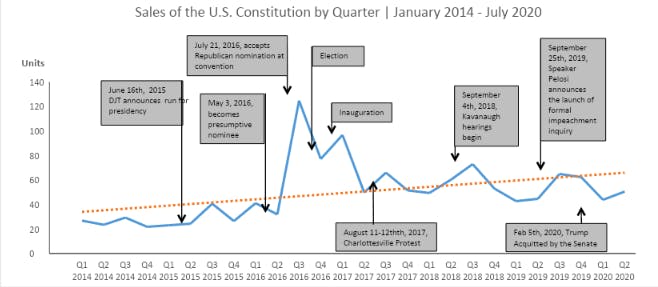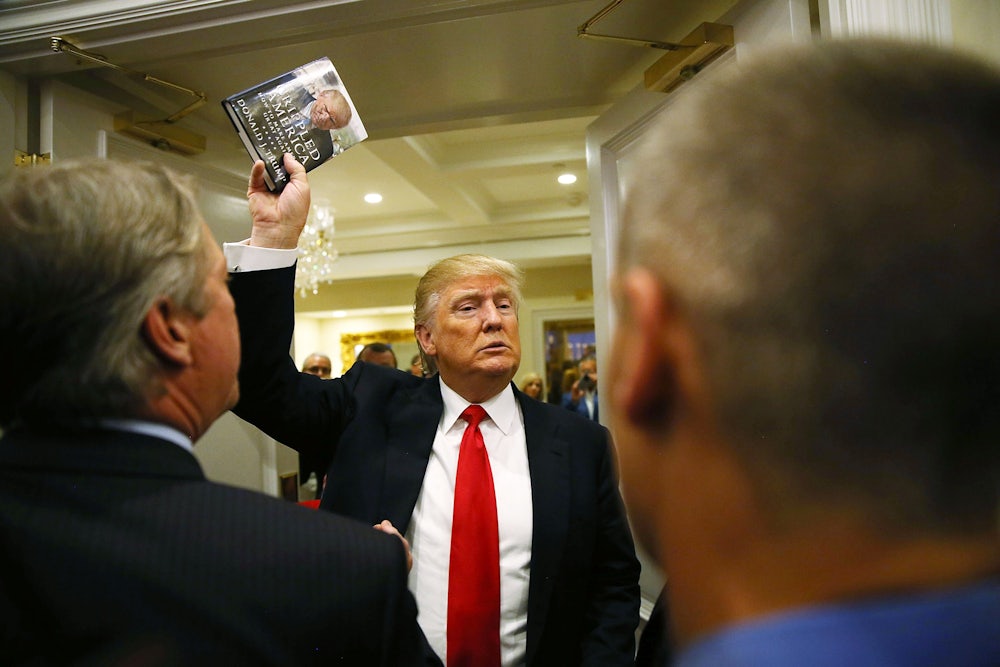As hard as it may be to believe, not too long ago, it was actually quite difficult to sell a book about Donald Trump. When investigative journalist David Cay Johnston sought a publisher for a biography shortly after Trump descended his golden escalator and announced his plans to seek the Republican nomination, he couldn’t get anyone to bite. “I tried to do a book when Donald announced in June of 2015, and Alice Martell, my literary agent, called around,” Johnston told Publishers Weekly in 2016. “But nobody believed he would get the nomination, so nobody wanted the book.” After Trump prevailed in the Republican presidential primary, two biographies were published—Johnston’s The Making of Donald Trump and The Washington Post’s Trump Revealed, both bestsellers.
Still, it wasn’t until Trump’s victory over Hillary Clinton that the floodgates finally opened. Now the publishing industry is awash with Trump bestsellers. Everyone is sick of Donald Trump, and nobody can stop reading about him.
The latest blockbusters in this milieu are The Room Where It Happened, by former national security adviser John Bolton, and Too Much and Never Enough, by the president’s niece, Mary Trump. Perhaps unsurprisingly, both paint a portrait of an incompetent, megalomaniacal fool who is fundamentally incapable of governing. In other words, these tomes more or less reveal that the president who’s paraded in front of us on an hourly basis is the same person behind the scenes—with a couple of splashy exceptions. The former title sold 780,000 copies its first week; the latter 950,000 on its first day, a record for Simon & Schuster, which published both and has gained a reputation for dropping mega-bestsellers about Donald Trump’s myriad failures and inadequacies. It’s been a long journey from David Cay Johnston’s stack of rejection letters to this boom time: Books about the president are the lifeblood of several major publishers.
There is a growing sense, moreover, that this trend is not going to go away—that Trump is reshaping American publishing, just as he is reshaping American political life. The polarization of American society is also affecting book publishing, a change that could have profound implications for the industry and the wider culture.
Speaking to New York at the end of 2018, Knopf vice president of publicity Nicholas Latimer summed up the mood in publishing: “We don’t have any” books about Donald Trump, he said. “I wish we did, but I’m glad we don’t.” It was a telling summation: Publishers were conflicted, embarrassed, and a little bit guilty-minded—but they were also more than happy for the sales boost. That year more political books were sold than in any year since NPD Bookscan began tracking books in 2004, executive director Kristen McLean told me. “Since 2016, we’ve definitely seen a very strong trend in sales of books related to political science, history, and biographies having to do with serving in the government.”
Since 2017, a great number of bestsellers have been published about President Trump. Michael Wolff’s Fire and Fury, published in early 2018, has sold several million copies. (Its less splashy sequel, Siege, was also a bestseller the following year, though it lagged far behind its predecessor.) Bob Woodward’s Fear sold 1.1 million copies its first week. James Comey’s A Higher Loyalty sold 600,000 in its first week. These mega-bestsellers have been surrounded by a host of other, more modest hits. The Mueller Report was a bestseller despite being available for free—and despite the fact that every news outlet in the country covered its key findings in strenuous detail. On the anti-Trump front, there have been books like A Warning, written by an anonymous Trump administration official; A Very Stable Genius, written by Washington Post reporters Philip Rucker and Carol Lenning; and Unhinged, an account of former Apprentice contestant Omarosa Manigault Newman’s time in the White House. There have, at the same time, been a great number of pro-Trump bestsellers: Donald Trump Jr.’s Triggered, Gregg Jarrett’s The Russia Hoax, and Judge Jeanine Pirro’s Liars, Leakers, and Liberals, among a great many others. Though they are overshadowed by their splashier counterparts, Trump is very much driving sales on the right as well.
“In the political science area, we’ve seen a high level of engagement with these books since the beginning of the Trump administration,” McLean said. “While every administration has books written about and for different constituencies, we’ve seen a pretty strong uptick in the number of books that have been written, both on the right and the left, since 2016. Just generally, I think the current polarization of the culture is driving a lot of book sales on all sides.”
The success of a number of other bestsellers—Michelle Obama’s Becoming and a host of anti-racist books, including How to Be an Antiracist and the ever-controversial White Fragility—can certainly be tied, albeit only to an extent, to the current president and the way he’s dominated the culture.
This Trump Effect is even manifesting itself in sales of print copies of the U.S. Constitution. Sales of our nation’s founding document, consistently brisk on the political right—the rise of the Tea Party inspired purchases long before Trump came on the scene—have exploded since Trump took office. In fact, there have been dramatic spikes among buyers of the Constitution at key moments of Trump’s political career: the 2016 Republican National Convention, the presidential election, Trump’s inauguration, the white supremacist uprising in Charlottesville, the Kavanaugh hearings, and the beginning and end of the impeachment hearings.

I once asked a publishing executive why there was no liberal equivalent of the highly partisan conservative imprints that regularly produce bestsellers for conglomerate publishers. He laughed. The rest of the publishing world is liberal, after all—what more could you want? But the recent slew of anti-Trump tomes may be signaling the emergence of a liberal counterbalance to conservative publishing. Either way, it’s becoming more and more clear that the flood of Trump-related bestsellers is likely to keep flowing even if Trump leaves office in January. It’s not hard to imagine a coming wave of tell-alls, especially from those officials who hung around the Trump White House a little too long and who might require a dose of reputation fumigation. There will undoubtedly be a goodly number of retrospectives from the Doris Kearns Goodwin set.
Many of these books will be, like many of the Trump bestsellers we have already seen, almost instantly disposable. The media does tend to report on the juicy bits and serve them up for free. But there will nevertheless be a hunger for those ineffable things that publishers theoretically provide: nuanced perspective, valuable insight, and the space to dive into complexity. (Indeed, when I asked one editor if he had any concerns about the continuing flood of Trump books he pushed back: “Why should I? People should want to know about this stuff!”)
The silver lining for many in the industry is that the profits raked in from selling pinguid Trump books can be redistributed to more deserving books. Publishing is notorious for its reliance on guesswork—many in the industry are fond of comparing it to gambling or venture capitalism, though it is slightly more seemly than either of those endeavors. But the sales of these books have cannibalized other categories. “When we see rises in nonfiction, we generally see that come from somewhere else,” McLean told me. “As a general trendline, it has come, in my opinion, from fiction. The cultural conversation is so intense, and people are thinking so much about what’s going on with themselves personally and with the larger culture that there’s more reading going on in nonfiction.”
This is not irreversible or fatal. There have been a number of recent positive developments in fiction sales. Although some still mourn the loss of Oprah’s (original) Book Club and Jon Stewart’s Daily Show, publishers have found valuable partners in Reese Witherspoon and Jenna Bush, whose book clubs have become enormously popular. But the decline in other areas—particularly what is known as the “midlist,” publishing’s middle class—is serious.
More so now than ever before, blockbusters dominate all aspects of publishing. What we’ve seen in recent years, however, is that an increasing number of those books relate to politics or current events. And that means those topics are, after a fallow period, back to driving sales.
There was a time, not that long ago, when—like most of America—publishers thought that this Trump boom would end when the president left office. It increasingly seems like it could outlast Trump’s own political career. “Regardless of your political persuasion,” McLean told me, “you cannot argue that the current political climate is not good for books—period.”
